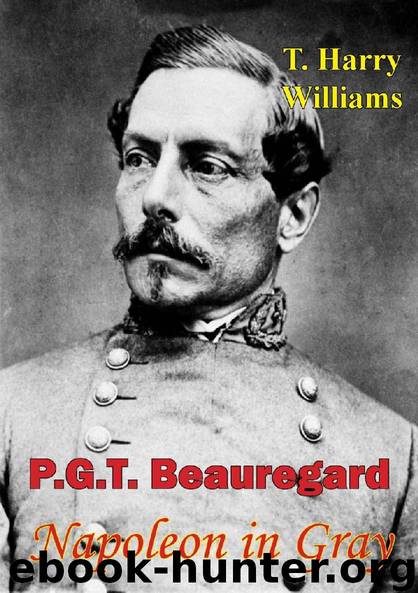P. G. T. Beauregard: Napoleon In Gray by T. Harry Williams

Author:T. Harry Williams [Williams, T. Harry]
Language: eng
Format: epub
Publisher: Golden Springs Publishing
Published: 2015-11-06T07:00:00+00:00
CHAPTER FOURTEEN — ON THE PETERSBURG LINE
Beauregard’s assurance to Bragg that he would undertake an immediate offensive was based on information he had received that the Federals were withdrawing from Bermuda Hundred. He planned to form a junction with Ransom, who had crossed to Drewry’s Bluff with part of the Richmond garrison, and attack Butler before he could leave. To verify his reports of the Federal movements, he prepared to send reconnaissance parties toward Bermuda.{529}
Beauregard’s information was wrong. Butler, instead of withdrawing, was preparing to advance toward Drewry’s Bluff. Another danger to the capital appeared in the presence of a large enemy cavalry force moving toward the city from the north. On the night of May 10–11 Beauregard received a telegram from Secretary Seddon warning that Richmond was in “hot danger.” Although the secretary did not see fit to tell Beauregard what the specific threats to the city were, he did give the general a sound analysis of the strategic situation and a sound order what to do. He directed Beauregard to leave Petersburg at the earliest moment and join his troops with Ransom’s at Drewry’s Bluff. Thus placed, the united Confederate forces would be in position to counter any move the Federals might make against Richmond or Petersburg.{530}
A juncture with Ransom was a part of Beauregard’s plan. With no objection, he ordered Hoke’s division to march to Drewry’s Bluff. He was not willing, however, to admit that his chance for an offensive had disappeared, and he had no intention of letting Seddon exercise a rigid control over his movements. After Hoke started Beauregard received information that Butler was evacuating Bermuda Hundred. Immediately he directed Hoke to move toward Bermuda and press the Federals. At the same time he informed Bragg that he had changed Hoke’s orders and asked for approval. No reply from Bragg came, but one from Seddon did. In emphatic language the secretary told Beauregard to obey the original directive. After another exchange of telegrams Beauregard countermanded his order to Hoke.{531}
Seddon was pained by the episode, and told Beauregard so. The general was pained too. He said that he was serving in the field at great danger to his health and that if his actions were not approved he wanted to be relieved. He informed Bragg that he would “insist” on receiving orders from only one source—from Bragg, as Davis’ military representative.{532} All of his sensitivity about official persecution was coming to the fore as he neared Richmond.
Beauregard did not follow Hoke’s troops and the other forces that were going to Drewry’s Bluff. He had asked Whiting to come up from Wilmington to take command at Petersburg. Before leaving he wanted to confer with Whiting and to collect two brigades arriving from Weldon. His delayed departure irritated the War Department. On May 12 the Federal cavalry force penetrated the outer defenses of the capital; on the same day Butler approached Drewry’s Bluff and probed at the fortifications. The high command felt that the commanding general should be at the point of danger.
Download
This site does not store any files on its server. We only index and link to content provided by other sites. Please contact the content providers to delete copyright contents if any and email us, we'll remove relevant links or contents immediately.
Blood and Oil by Bradley Hope(1558)
Wandering in Strange Lands by Morgan Jerkins(1418)
Ambition and Desire: The Dangerous Life of Josephine Bonaparte by Kate Williams(1383)
Daniel Holmes: A Memoir From Malta's Prison: From a cage, on a rock, in a puddle... by Daniel Holmes(1329)
Twelve Caesars by Mary Beard(1313)
It Was All a Lie by Stuart Stevens;(1294)
The First Conspiracy by Brad Meltzer & Josh Mensch(1167)
What Really Happened: The Death of Hitler by Robert J. Hutchinson(1154)
London in the Twentieth Century by Jerry White(1145)
The Japanese by Christopher Harding(1130)
Time of the Magicians by Wolfram Eilenberger(1125)
Twilight of the Gods by Ian W. Toll(1117)
Cleopatra by Alberto Angela(1093)
A Woman by Sibilla Aleramo(1092)
Lenin: A Biography by Robert Service(1074)
John (Penguin Monarchs) by Nicholas Vincent(1068)
The Devil You Know by Charles M. Blow(1024)
Reading for Life by Philip Davis(1023)
The Life of William Faulkner by Carl Rollyson(981)
